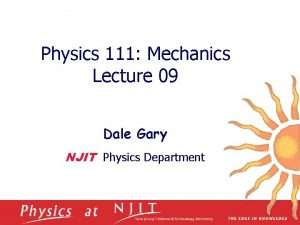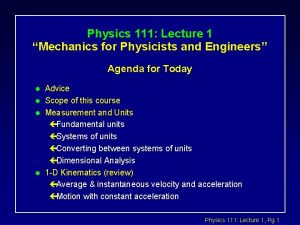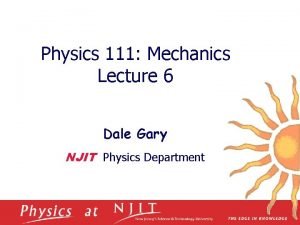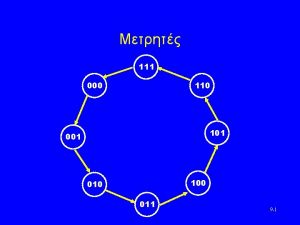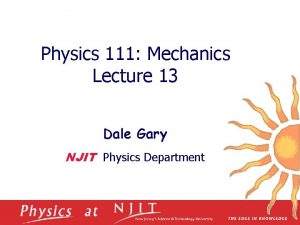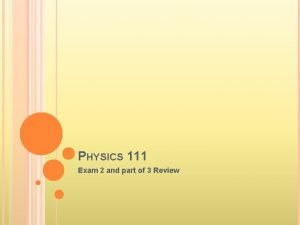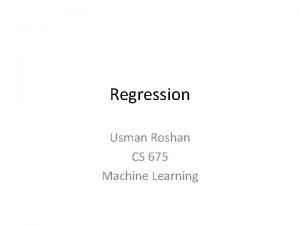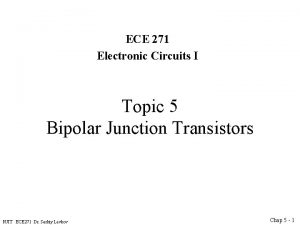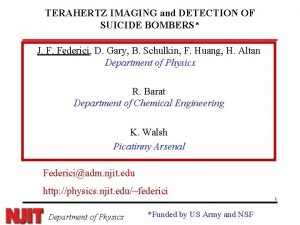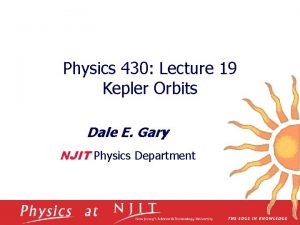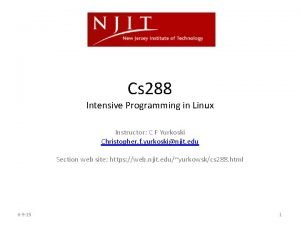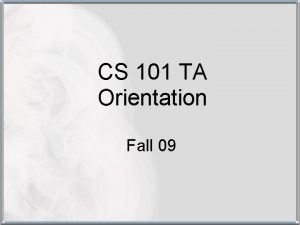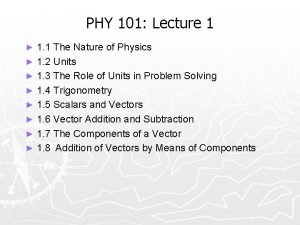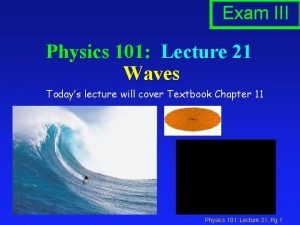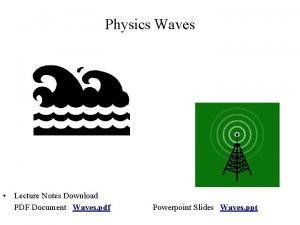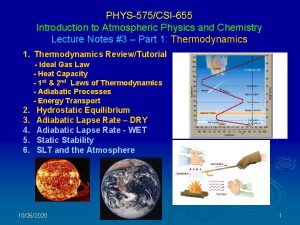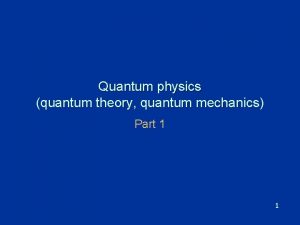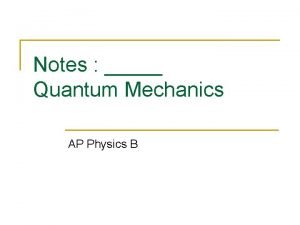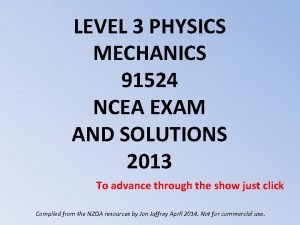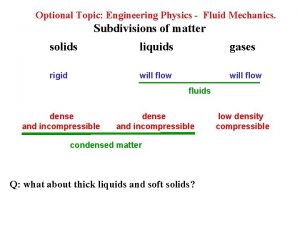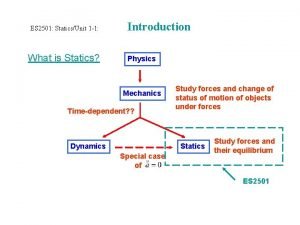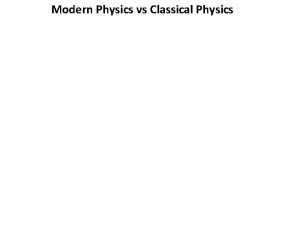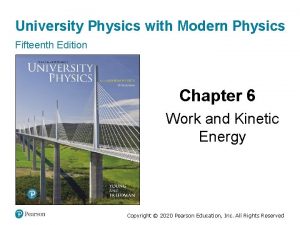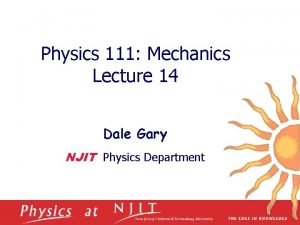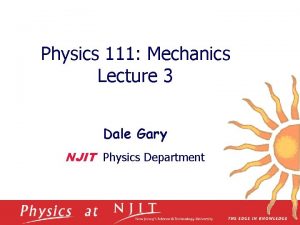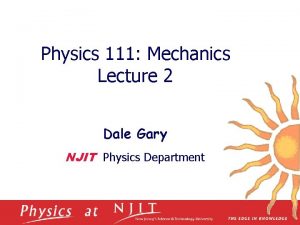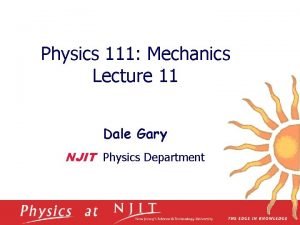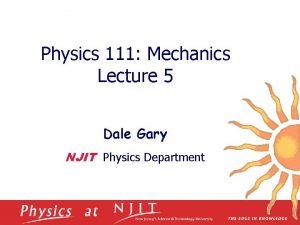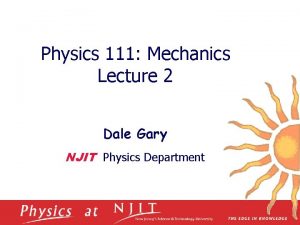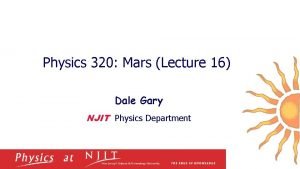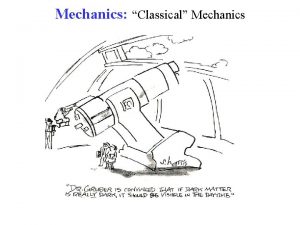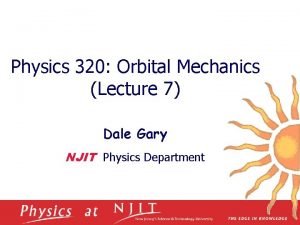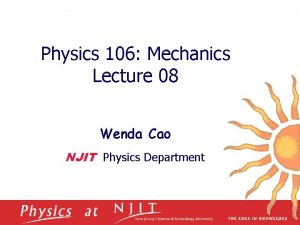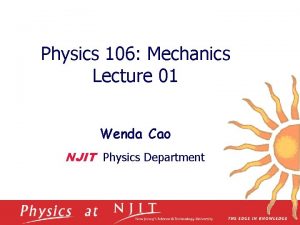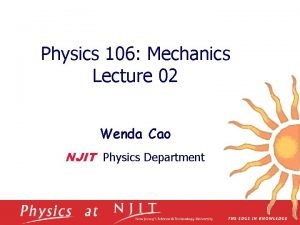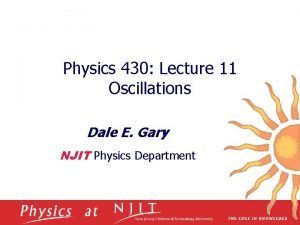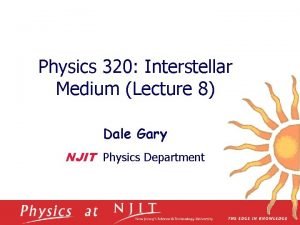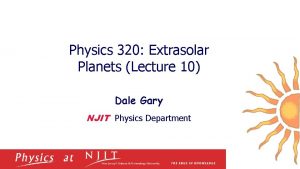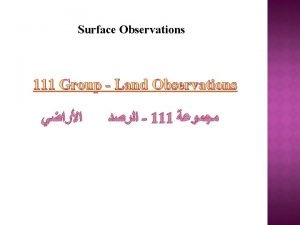Physics 111 Mechanics Lecture 09 Dale Gary NJIT






































- Slides: 38

Physics 111: Mechanics Lecture 09 Dale Gary NJIT Physics Department

Rotational Motion q Angular Position and Radians q q q Angular Velocity Angular Acceleration Rigid Object under Constant Angular Acceleration Angular and Translational Quantities Rotational Kinetic Energy Moments of Inertia 31 October 2020

Angle and Radian q What is the circumference S ? q q can be defined as the arc length s along a circle divided by the radius r: r s q q q is a pure number, but commonly is given the artificial unit, radian (“rad”) Whenever using rotational equations, you must use angles expressed in radians 31 October 2020

Conversions q Comparing degrees and radians q Converting from degrees to radians q Converting from radians to degrees 31 October 2020

Rigid Object q. A n n rigid object is one that is nondeformable The relative locations of all particles making up the object remain constant All real objects are deformable to some extent, but the rigid object model is very useful in many situations where the deformation is negligible q This simplification allows analysis of the motion of an extended object 31 October 2020

Recall: 1 -Dimensional Position x What is motion? Change of position over time. q How can we represent position along a straight line? q Position definition: q n n n q Defines a starting point: origin (x = 0), x relative to origin Direction: positive (right or up), negative (left or down) It depends on time: t = 0 (start clock), x(t=0) does not have to be zero. Position has units of [Length]: meters. x = + 2. 5 m x=-3 m 31 October 2020

Angular Position q q q Axis of rotation is the center of the disc Choose a fixed reference line Point P is at a fixed distance r from the origin As the particle moves, the only coordinate that changes is As the particle moves through , it moves though an arc length s. The angle , measured in radians, is called the angular position. 31 October 2020

Recall: Displacement is a change of position in time. q Displacement: q n f stands for final and i stands for initial. It is a vector quantity. q It has both magnitude and direction: + or - sign q It has units of [length]: meters. x (t ) = + 2. 5 m q 1 1 x 2 (t 2) = - 2. 0 m Δx = -2. 0 m - 2. 5 m = -4. 5 m x 1 (t 1) = - 3. 0 m x 2 (t 2) = + 1. 0 m Δx = +1. 0 m + 3. 0 m = +4. 0 m 31 October 2020

Angular Displacement q The angular displacement is defined as the angle the object rotates through during some time interval SI unit: radian (rad) q This is the angle that the reference line of length r sweeps out q 31 October 2020

Recall: Velocity q q q Velocity is the rate of change of position. Velocity is a vector quantity. Velocity has both magnitude and direction. Velocity has a unit of [length/time]: meter/second. Definition: n Average velocity n Average speed n Instantaneous velocity 31 October 2020

Average and Instantaneous Angular Speed q The average angular speed, ωavg, of a rotating rigid object is the ratio of the angular displacement to the time interval q The instantaneous angular speed is defined as the limit of the average speed as the time interval approaches zero SI unit: radian per second (rad/s) q Angular speed positive if rotating in counterclockwise q Angular speed will be negative if rotating in clockwise q 31 October 2020

Recall: Average Acceleration q q q Changing velocity (non-uniform) means an acceleration is present. Acceleration is the rate of change of velocity. Acceleration is a vector quantity. Acceleration has both magnitude and direction. Acceleration has a unit of [length/time 2]: m/s 2. Definition: n Average acceleration n Instantaneous acceleration 31 October 2020

Average Angular Acceleration q The average angular acceleration, a, of an object is defined as the ratio of the change in the angular speed to the time it takes for the object to undergo the change: t = t i : wi t = t f : wf 31 October 2020

Instantaneous Angular Acceleration q The instantaneous angular acceleration is defined as the limit of the average angular acceleration as the time goes to 0 SI Units of angular acceleration: rad/s² q Positive angular acceleration is counterclockwise (RH rule – curl your fingers in the direction of motion). q n n q if an object rotating counterclockwise is speeding up if an object rotating clockwise is slowing down Negative angular acceleration is clockwise. n n if an object rotating counterclockwise is slowing down if an object rotating clockwise is speeding up 31 October 2020

Rotational Kinematics q A number of parallels exist between the equations for rotational motion and those for linear motion. q Under constant angular acceleration, we can describe the motion of the rigid object using a set of kinematic equations n n These are similar to the kinematic equations for linear motion The rotational equations have the same mathematical form as the linear equations 31 October 2020

Analogy with Linear Kinematics q Start with angular acceleration: q Integrate once: q Integrate again: q Just substitute symbols, and all of the old equations apply: 31 October 2020

Comparison Between Rotational and Linear Equations 31 October 2020

A Rotating Wheel q A wheel rotates with a constant angular acceleration of 3. 5 rad/s 2. If the angular speed of the wheel is 2. 0 rad/s at t = 0 (a) through what angle does the wheel rotate between t = 0 and t = 2. 0 s? Given your answer in radians and in revolutions. (b) What is the angular speed of the wheel at t = 2. 0 s? 31 October 2020

Hints for Problem-Solving q Similar to the techniques used in linear motion problems n With constant angular acceleration, the techniques are much like those with constant linear acceleration q There are some differences to keep in mind n For rotational motion, define a rotational axis n The choice is arbitrary n Once you make the choice, it must be maintained n In some problems, the physical situation may suggest a natural axis n The object keeps returning to its original orientation, so you can find the number of revolutions made by the body 31 October 2020

Relationship Between Angular and Linear Quantities Every point on the rotating object has the same angular motion q Every point on the rotating object does not have the same linear motion q Displacement q q Speeds q Accelerations 31 October 2020

Speed Comparison q The linear velocity is always tangent to the circular path n Called the tangential velocity q The magnitude is defined by the tangential speed 31 October 2020

Acceleration Comparison q The tangential acceleration is the derivative of the tangential velocity 31 October 2020

Speed and Acceleration Note q All points on the rigid object will have the same angular speed, but not the same tangential speed q All points on the rigid object will have the same angular acceleration, but not the same tangential acceleration q The tangential quantities depend on r, and r is not the same for all points on the object 31 October 2020

Centripetal Acceleration q An object traveling in a circle, even though it moves with a constant speed, will have an acceleration n Therefore, each point on a rotating rigid object will experience a centripetal acceleration 31 October 2020

Resultant Acceleration q The tangential component of the acceleration is due to changing speed q The centripetal component of the acceleration is due to changing direction q Total acceleration can be found from these components 31 October 2020

Rotational Kinetic Energy q An object rotating about z axis with an angular speed, ω, has rotational kinetic energy q Each particle has a kinetic energy of K i = ½ mi v i 2 q Since the tangential velocity depends on the distance, r, from the axis of rotation, we can substitute vi = wri => Ki = ½ miw 2 ri 2 31 October 2020

Rotational Kinetic Energy, cont’d q The total rotational kinetic energy of the rigid object is the sum of the energies of all its particles q Where I is called the moment of inertia 31 October 2020

Rotational Kinetic Energy, cont’d q There is an analogy between the kinetic energies associated with linear motion (K = ½ mv 2) and the kinetic energy associated with rotational motion (KR = ½ Iw 2) q Rotational kinetic energy is not a new type of energy, the form is different because it is applied to a rotating object q Units of rotational kinetic energy are Joules (J) 31 October 2020

Moment of Inertia of Point Mass q For a single particle, the definition of moment of inertia is n n m is the mass of the single particle r is the rotational radius q SI units of moment of inertia are kg. m 2 q Moment of inertia and mass of an object are different quantities q It depends on both the quantity of matter and its distribution (through the r 2 term) 31 October 2020

Moment of Inertia of Point Mass q For a composite particle, the definition of moment of inertia is n n mi is the mass of the ith single particle ri is the rotational radius of ith particle SI units of moment of inertia are kg. m 2 q Consider an unusual baton made up of four sphere fastened to the ends of very light rods q Find I about an axis perpendicular to the page and passing through the point O where the rods cross q 31 October 2020

The Baton Twirler Consider an unusual baton made up of four sphere fastened to the ends of very light rods. Each rod is 1. 0 m long (a = b = 1. 0 m). M = 0. 3 kg and m = 0. 2 kg. q (a) Find I about an axis perpendicular to the page and passing through the point where the rods cross. Find KR if angular speed is q (b) The majorette tries spinning her strange baton about the axis y, calculate I of the baton about this axis and KR if angular speed is q 31 October 2020

Moment of Inertia of Extended Objects Divided the extended objects into many small volume elements, each of mass Dmi q We can rewrite the expression for I in terms of Dm q q Consider a small volume such that dm = r d. V. Then q If r is constant, the integral can be evaluated with known geometry, otherwise its variation with position must be known 31 October 2020

Densities q You know the density (volume density) as mass/unit volume n r = M/V = dm/d. V => dm = rd. V q We can define other densities such as surface density (mass/unit area) n q Or n s = M/A = dm/d. A => dm = sd. V linear density (mass/unit length) l = M/L = dm/dx => dm = ld. V 31 October 2020

Moment of Inertia of a Uniform Rigid Rod q The shaded area has a mass n dm = l dx q Then the moment of inertia is 31 October 2020

Moment of Inertia for some other common shapes 31 October 2020

31 October 2020

Parallel-Axis Theorem In the previous examples, the axis of rotation coincides with the axis of symmetry of the object q For an arbitrary axis, the parallel-axis theorem often simplifies calculations q The theorem states I = ICM + MD 2 q n n n D I is about any axis parallel to the axis through the center of mass of the object ICM is about the axis through the center of mass D is the distance from the center of mass axis to the arbitrary axis 31 October 2020

Moment of Inertia of a Uniform Rigid Rod q The moment of inertia about y is q The moment of inertia about y’ is 31 October 2020
 Njit kepler
Njit kepler Physics 111 lecture notes
Physics 111 lecture notes Dale gary
Dale gary 110-000-110 & 111-000-111
110-000-110 & 111-000-111 Physics 121 njit
Physics 121 njit Kepler njit
Kepler njit Physics 111 exam 2
Physics 111 exam 2 01:640:244 lecture notes - lecture 15: plat, idah, farad
01:640:244 lecture notes - lecture 15: plat, idah, farad Usman roshan njit
Usman roshan njit Cs 288 njit
Cs 288 njit Njit ethernet
Njit ethernet Cristian borcea njit
Cristian borcea njit Ivon nunez njit
Ivon nunez njit Food near njit
Food near njit Njit eop office
Njit eop office Cs 675 njit
Cs 675 njit Reverse transfer njit
Reverse transfer njit Uc davis eop
Uc davis eop Njit suicide
Njit suicide Kepler 4 njit
Kepler 4 njit Njitpipeline
Njitpipeline Cs 288 njit
Cs 288 njit Cs 288 njit
Cs 288 njit Cs101 njit
Cs101 njit Physics 101 lecture
Physics 101 lecture Phy101 lecture 1
Phy101 lecture 1 Physics 101 lecture notes pdf
Physics 101 lecture notes pdf Physics notes pdf
Physics notes pdf Atmospheric physics lecture notes
Atmospheric physics lecture notes Classical physics
Classical physics Beta plus decay
Beta plus decay Nzqa mechanics level 1 past papers
Nzqa mechanics level 1 past papers Quantum physics vs mechanics
Quantum physics vs mechanics Physics ia ideas sports
Physics ia ideas sports Chapter 8 fluid mechanics
Chapter 8 fluid mechanics Fluid mechanics
Fluid mechanics Physics mechanics
Physics mechanics Why does it happen
Why does it happen University physics with modern physics fifteenth edition
University physics with modern physics fifteenth edition
